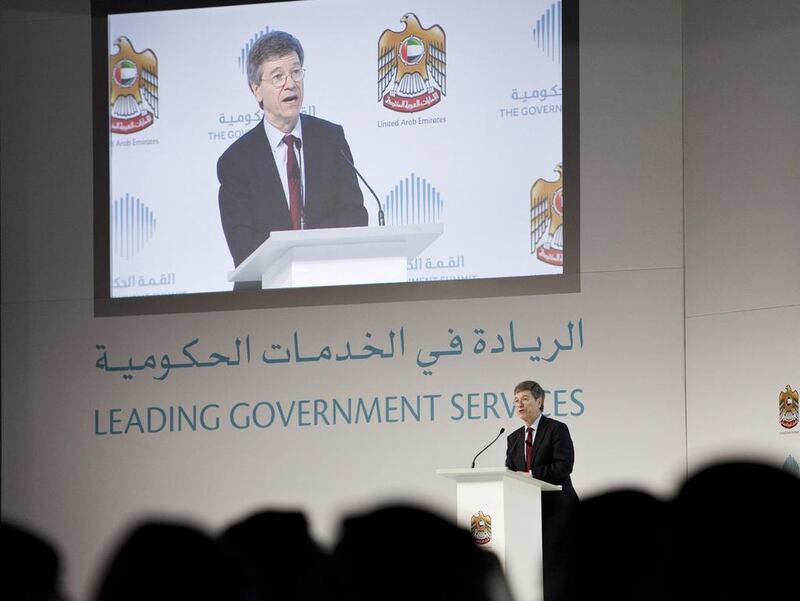DUBAI // If anyone knows about happiness, Jeffrey Sachs does.
Prof Sachs is not only a leading economist and author, and director of the Earth Institute at Columbia University in the United States, he is also one of the editors of the United Nations World Happiness Report, which placed the UAE 14th in the world.
So when he says the US has lessons to learn from the UAE on citizen happiness, Washington would perhaps be wise to listen.
“Fortunately, we are in a happy region,” Prof Sachs told the Government Summit in Dubai. “The UAE ranks among the happiest places in the world. This is going to be even more true as a result of the pioneering work being done in this country to discover new ways to promote happiness.
“The UAE is number 14 on the list. This is a great accomplishment and reflects the very hard work that is being undertaken in this country with a lot of insight and creativity to promote widespread well-being.
“You rate three steps above the United States, which is ranked 17. We hope we can take your example and keep up.”
Prof Sachs said individuals could not make themselves happy, but needed a helping hand from their government.
“When perceptions of corruption are high, people do not feel secure or happy. Therefore the quality of governance, the rule of law, sense of justice and fairness, transparency of political decision making are all important determinants of happiness,” he said.
“Happiness is a goal to strive for and depends on individuals, the health of society and the performance of governments.”
The World Happiness Report 2013, released in September last year, measured the well-being of people in 150 countries. It found the happiest countries were in Northern Europe – Denmark, Norway, Finland and the Netherlands – while the least happy were poor Sub-Saharan African nations such as Togo, Benin, the Central African Republic and Sierra Leone.
Prof Sachs said countries must take the “middle path between denial and excess” if their citizens were to be satisfied with life.
“America is not one of the happiest places in the world even though it’s one of the richest because it has devoted too much effort to the material side and not enough to some other crucial determinants of happiness.
“All great people have said ‘follow the moderate pursuit of material life’. They all talked about the middle path between denial and excess, which is the most fulfilling approach for well-being.”
Reflecting on the conflicts in the region, Prof Sachs said states such as Syria, Yemen and Afghanistan were at the bottom of the happiness ladder because they were mired in poverty and crises.
Well known for his advisory role to developing countries, he urged governments to help to end the war in these “cradles of civilisation” and stop the flow of arms.
“We have to end the wars in these countries because devastation causes the most intense unhappiness. There is no need for these wars. There is destruction of lives and countries that are some of the wonders of civilisation and yet we are careless.
“The Middle East has always been a place where there is too much outside meddling and not enough opportunities for internal leadership.
“We can solve conflicts like the Syrian conflict by ending the violence fast and allowing some healing to take place. The most important thing is to stop the inflow of arms from all sides.
“Syria is one of the most beautiful countries and is being destroyed very rapidly by heavy armaments and by neighbours feeding the conflicts. Keep the weapons out, stop the fighting and there can be political compromise.”
pkannan@thenational.ae






